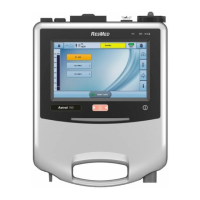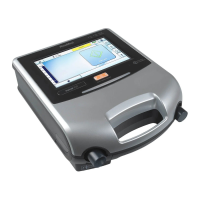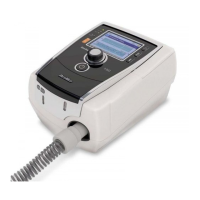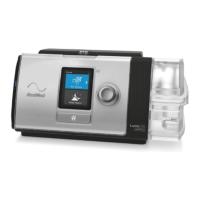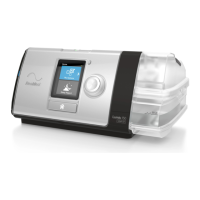Do you have a question about the ResMed Astral 100 and is the answer not in the manual?
Specifies the target patient population and conditions for mechanical ventilation.
Describes the advantages of mechanical ventilation in acute and chronic settings.
Details the patient groups requiring mechanical ventilation, acute and chronic.
Lists pre-existing conditions where the Astral device is contraindicated.
Lists potential side effects that may arise during device use.
Provides essential safety warnings and cautions for operating the device.
Describes the components of the Astral device through an image and labels.
Explains the touch screen interface and its interactive elements.
Details the information displayed in the top bar of the touch screen.
Describes the main menus accessible via the Menu bar.
Explains the function of the Bottom bar and its buttons.
Details the Main screen and how functions are accessed.
Explains the real-time pressure data shown on the Pressure bar graph.
Guides users through performing a functional test before initial therapy use.
Details the steps to power on the Astral device and system check.
Explains how to safely power off the Astral device.
Describes the 'Big buttons' mode for easier usability and accessibility.
Provides instructions on how to start and stop ventilation therapy.
Explains how to lock and unlock the touch screen for security or accidental touch prevention.
Explains how to navigate the four main menus and their sub-menus.
Describes the Monitors menu and its sub-menus for viewing data.
Details the Waveforms screen for displaying pressure and flow graphs.
Explains the Monitoring screen displaying measured parameters numerically.
Describes the Trends screen showing percentile values for various parameters.
Details the four sub-menus within the Setup menu for configuration.
Explains the Alarms menu for viewing individual alarm thresholds.
Describes the Information menu and its sub-menus for events, device, and battery.
Lists and describes configurable device settings.
Explains how to access and adjust various device settings.
Details how clinicians configure programs for different therapy options.
Guides users on how to change between configured ventilation programs.
Explains the Manual Breath feature for delivering larger breaths.
Describes the Sigh Breath feature for delivering magnified breaths.
Provides safety and packing guidelines for travelling with the Astral device.
Details available circuit options and their suitability for different patient types.
Explains how to connect a single limb circuit with an intentional leak.
Guides on how to fit the correct adapter for patient circuit connection.
Details how to connect a single limb circuit for invasive ventilation.
Explains how to connect a single limb circuit with an expiratory valve.
Provides steps for connecting a standard single limb valved circuit.
Guides on connecting a double limb circuit for the Astral 150 model.
Details how to connect a mouthpiece circuit for ventilation.
Explains the Learn Circuit function for determining circuit characteristics.
Describes the icons and meanings for Learn Circuit test results.
Explains the icons and meanings for Device Test results.
Details the results for Oxygen sensor calibration during Learn Circuit.
Describes the results for Expiratory Flow Sensor calibration.
Lists and describes power accessories compatible with the Astral device.
Lists optional accessories that can be used with the Astral device.
Guides on attaching a humidifier or HME for therapy.
Explains how to attach a Heat Moisture Exchange (HME) accessory.
Details how to attach a bacterial/viral filter for protection.
Explains how to add supplemental oxygen to the therapy.
Explains how the FiO2 sensor monitors oxygen delivery.
Guides on attaching a nebuliser for drug delivery.
Introduces other accessories that can be attached to the device.
Details how to attach a pulse oximeter sensor for monitoring.
Explains how to connect the ResMed Remote Alarm II.
Provides steps for connecting the device to mains power.
Details how to connect the Astral External Battery for extended power.
Explains how to connect to a ResMed Power Station (RPSII).
Guides on connecting to an external DC power source.
Describes the function and limitations of the internal battery.
Provides instructions for storing and recharging the internal battery.
Explains how to view battery charge levels and power source information.
Details how to use and pack the Astral Carry Bag.
Explains the alarm display and how it shows active alarms.
Describes the Active Alarms screen for viewing all active alarms.
Details the function of the Alarm mute/reset button.
Explains the Alarm bar's role in indicating alarm priority.
Classifies alarms by priority (high, medium, low) and their alerts.
Lists and describes high priority alarms requiring immediate attention.
Lists and describes medium priority alarms.
Lists and describes low priority alarms.
Guides on how to view active alarms and the Active alarms screen.
Explains how to temporarily mute audible alarm alerts.
Details procedures for resetting displayed and all active alarms.
Explains how to adjust the alarm volume level.
Guides on how to test the alarm sounders and indicators for proper function.
Explains how to test the ResMed Remote Alarm II.
Describes functional tests for common Astral alarms.
Explains the Astral Disconnection Alarm's function and activation.
Guides on how clinicians can adjust Disconnection Alarm settings.
Provides steps to transfer data from the Astral device to a USB stick.
Details cleaning and maintenance for single patient use components.
Outlines monthly cleaning and maintenance tasks for the device.
Specifies tasks required before providing the device to a new patient.
Guides on how to remove and replace the air filter.
Explains how to replace the double limb adapter.
Details servicing requirements and warnings for device repair.
Provides a schedule for regular device servicing.
Discusses the expected life and replacement of the internal battery.
Explains where to find device information like serial number and service dates.
Provides troubleshooting steps for common alarm issues.
Lists and describes power-related alarms and their causes.
Offers solutions for errors encountered during the Learn Circuit process.
Provides solutions for general issues like condensation or screen unresponsiveness.
Details the device's operating pressure ranges for different modes.
Specifies the pressure measurement accuracy of the device.
Lists the operating tidal volume ranges for volume control modes.
Defines circuit resistance and compliance ranges for accurate monitoring.
Specifies breathing resistance limits under single fault conditions.
States the device's compliance with electromagnetic compatibility requirements.
Identifies the intended operators of the Astral device.
Provides information on device software release compatibility.
Details the available data connection ports on the Astral device.
Lists the IEC 60601-1 classifications for the device.
Explains common symbols found on the product or packaging.
Lists the standards the Astral device complies with.
Defines various ventilation settings available on the Astral device.
Defines measured and calculated parameters displayed during ventilation.
| Device Type | Ventilator |
|---|---|
| Data Storage | SD card |
| Battery Life | Up to 8 hours |
| Modes | CPAP, PAC, iVAPS |
| Pressure Range | 4 to 50 cm H2O |
| FiO2 Monitoring | Yes |
| Alarms | High pressure, Low pressure, High respiratory rate, Apnea |
| Humidification | Optional external humidifier |
| Tidal Volume | 50 – 2500 mL |
| Inspiratory Time | 0.3 – 5 seconds |
